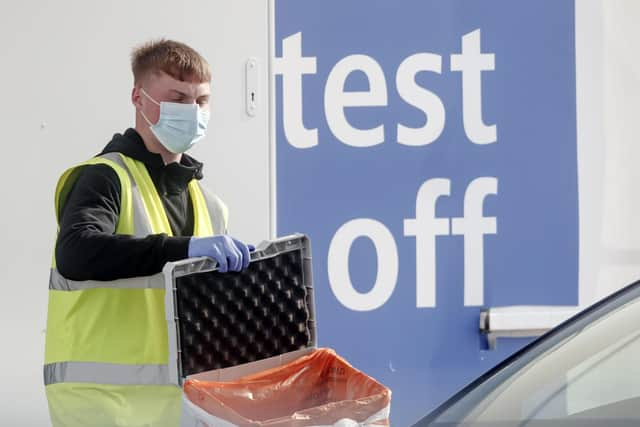Largest coronavirus testing program shows rising case numbers
and live on Freeview channel 276
More than 300,000 volunteers were tested across England between July 24 and September 7.
The findings from Imperial College London and Ipsos MORI show cases are steadily increasing across the country and the virus is now doubling every seven to eight days.
Advertisement
Hide AdAdvertisement
Hide AdIt is estimated 13 people per 10,000 were infected in England between August 22 and September 7, compared to four people per 10,000 between July 24 and August 11.


The Government said the findings reinforced the need for public vigilance.
Health and Social Care Secretary Matt Hancock said: “We’ve seen all across the world how a rise in cases, initially among younger people, leads to hospitalisations and fatalities.
"The pandemic is not over, and everyone has a role to play to keep the virus at bay and avoid another further restrictions.
Advertisement
Hide AdAdvertisement
Hide Ad“It’s so important that everyone abides by the law and socialise in groups up to six, make space between you and those outside your household, get a test and self-isolate if you develop symptoms and wash your hands regularly.
"It is vital you engage with NHS Test and Trace service if contacted to provide details of your close contacts and self-isolate if you are asked to do so.”
Covid-19 cases are shown as no longer clustering in healthcare or care home settings, as seen in May and June, suggesting the virus is now spread more widely in the community.
Infections are increasing across all adult age groups below the age of 65 years and across all areas of the country, with higher rates seen in young people aged 18 to 24 years. Infection is highest in Yorkshire and the Humber, the North East and the North West.
Advertisement
Hide AdAdvertisement
Hide AdThe Prime Minister this week announced further measures to keep coronavirus cases low.
From Monday the rule of six is being introduced in law, meaning individuals must only meet socially in groups of up to six people in any settings indoors or outdoors, including homes, restaurants and pubs.
There are some exemptions including organised sports, weddings and funerals.
The Government said social distancing must also be maintained with people outside of the household.
Advertisement
Hide AdAdvertisement
Hide AdProfessor Paul Elliott, director of the programme at Imperial from the School of Public Health, said: “Our large and robust dataset clearly shows a concerning trend in coronavirus infections, where cases are growing quickly across England and are no longer concentrated in key workers.
"What we are seeing is evidence of an epidemic in the community and not a result of increased testing capacity. This is a critical time and it’s vital that the public, our health system and policy-makers are aware of the situation as we cannot afford complacency.”
The programme is the largest, most significant piece of research looking at how the virus is spreading across the country.
The study was commissioned by the Department for Health and Social Care and carried out by a team of scientists, clinicians and researchers at Imperial College London, Imperial College Healthcare NHS Trust and Ipsos MORI.